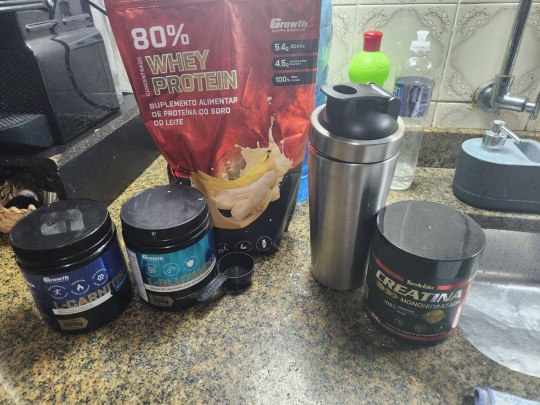#l-glutamine
Explore tagged Tumblr posts
Text
10/24/23
Craving management Strategy
Ok.... so I ate a bunch of bars last night, in the hope that eating extra calories would stop the yucky cravings. Reset back to factory settings 😃
Took 2 kinds of magnesium supplements, a tablet and natural calm.
Took half a serving of crave, which I cannot find anymore [so sad].
Read a book and took a bath. Tried for an early bedtime.
Slept late, past 8:30.
Morning strategy....
Morning supps- check.
Added L-Glutamine to my morning coffee mixture. (Which is normally brewed coffee, gluccomannon powder, and jordan's skinny syrup).
Took some fiber tabs, which I think I missed for a couple days.

#craving#cravings management#cravings management strategy#healthy lifestyle#getting healthy#losing weight#healthy eating#fitblr#healthy habits#operation lose this gut#weight loss#operationlosethisgut#weight loss journey#delicious coffee#need coffee#coffee is life#coffee#L-Glutamine#power#fit fam#keep fit#health and fitness#fit#weightloss diet#diet help#dieting#diet plan#diet#weight loss diet#100 pounds lost
6 notes
·
View notes
Text
The Role of Amino Acids in Stroke Prevention and Recovery
Stroke recovery and prevention go beyond medications and surgeries. The body’s natural building blocks—amino acids—play a critical role in brain health, helping to protect neurons, repair damaged tissues, and support neuroplasticity after a stroke. Understanding which amino acids are essential, how they work, and the proper balance can significantly enhance recovery. In this article, we’ll delve…
#Amino acids#brain health#dietary strategies#glutamate#L-Glutamine#neuroplasticity#neuroprotection#stroke prevention#stroke recovery#taurine
0 notes
Text

Safety Information:
Consult your physician in case you are taking any other medication before consuming this product.
Ingredients:
L-Leucine, L-Isoleucine, L-valine, L-Glutamine, Maltodextrin powder, L-Taurine, L-Citrulline,
#Ingredients:#L-Leucine#L-Isoleucine#L-valine#L-Glutamine#Maltodextrin powder#L-Taurine#L-Citrulline#BCAA Supplements
0 notes
Text
Optimizing Amino Acid Intake in a Diabetic Diet: Key Strategies for Blood Sugar Management

Amino acids play a crucial role in maintaining overall health, and their importance in a diabetic diet cannot be understated. For individuals with diabetes, optimizing amino acid intake is essential for supporting blood sugar management and promoting overall well-being. In this blog post, we will explore the significance of amino acids in a diabetic diet and provide key strategies to help individuals with diabetes optimize their amino acid intake for better blood sugar control. Let's dive in and discover how amino acids can positively impact blood sugar management in people with diabetes.
Understanding Amino Acids and Diabetes
Amino acids are the building blocks of proteins and play a crucial role in various bodily functions. When it comes to blood sugar regulation, amino acids have a significant impact. They are involved in insulin production, which is the hormone responsible for regulating blood sugar levels. Amino acids also influence insulin sensitivity, allowing the body to effectively utilize glucose from the bloodstream. Maintaining a balanced amino acid profile is particularly important for individuals with diabetes. An imbalance or deficiency in certain amino acids can disrupt insulin production and function, leading to blood sugar fluctuations. By ensuring an optimal amino acid profile, individuals with diabetes can support their body's ability to regulate blood sugar levels and promote overall health and well-being.

Essential Amino Acids for Blood Sugar Management
Certain amino acids have been found to be particularly beneficial for blood sugar management in individuals with diabetes. These amino acids play a vital role in supporting insulin function and glucose metabolism. One such amino acid is L-arginine. L-arginine is considered semi-essential or conditionally essential amino acid, meaning that it becomes essential under certain circumstances and conditions, including pregnancy, infancy, critical illness, and trauma. L-arginine has been shown to enhance insulin sensitivity and improve glucose uptake by cells. Foods rich in L-arginine include lean meats, poultry, fish, nuts, and seeds.

Another important amino acid is L-glutamine. Several studies have shown that L-Glutamine directly introduces glucose into the bloodstream. More importantly, L-Glutamine has been found to support insulin production in pancreas. This in-turn helps regulate blood-glucose levels and supports healthy glucose metabolism. Food sources abundant in L-glutamine include beef, chicken, fish, dairy products, tofu, and legumes.

Furthermore, L-carnitine is an amino acid that aids in the transportation of fatty acids into cells for energy production. This process helps regulate blood sugar levels and promotes insulin sensitivity. Animal proteins like beef, pork, poultry, and fish are excellent sources of L-carnitine.

By incorporating these amino acid-rich foods into a diabetic diet, individuals can support their blood sugar management and overall health. However, it is essential to consult with a healthcare professional or registered dietitian to determine the appropriate amounts and sources of these amino acids based on individual needs.
Plant-Based Protein Sources for Diabetics
Incorporating plant-based protein sources into a diabetic diet offers numerous benefits. Plant-based proteins are often lower in saturated fats and cholesterol, making them heart-healthy choices. They also provide dietary fiber, which aids in blood sugar control and promotes satiety. Several plant-based protein sources are rich in essential amino acids and suitable for blood sugar management. Legumes such as lentils, chickpeas, and black beans are excellent options, as they are high in protein and fiber. Quinoa, a grain-like seed, is another protein-rich food that contains all essential amino acids.

Additionally, soy products like tofu and tempeh are complete protein sources that provide essential amino acids. Nuts and seeds, including almonds, chia seeds, and pumpkin seeds, offer protein along with healthy fats and fiber. By including these plant-based protein sources in their diet, individuals with diabetes can benefit from the essential amino acids they provide while supporting blood sugar management. However, it is important to work with a healthcare professional or registered dietitian to ensure appropriate portion sizes and overall dietary balance.
Timing and Distribution of Protein Intake
The timing and distribution of protein intake play a crucial role in blood sugar management for individuals with diabetes. Spreading protein intake throughout the day is important to support stable blood sugar levels. Consuming protein-rich foods in each meal and snack helps slow down digestion, leading to a gradual release of glucose into the bloodstream. This can prevent sharp spikes in blood sugar levels. To incorporate protein-rich foods into meals and snacks, consider adding lean meats, poultry, fish, or plant-based proteins like tofu or legumes to main meals. Including dairy products, such as Greek yogurt or cottage cheese, in snacks can also provide a protein boost. Additionally, incorporating protein-rich snacks between meals can help maintain steady blood sugar levels. Snack options include a handful of nuts, a hard-boiled egg, or a protein shake made with low-sugar ingredients. By paying attention to the timing and distribution of protein intake, individuals with diabetes can support stable blood sugar levels throughout the day. As always, it is essential to work with a healthcare professional or registered dietitian to develop a personalized dietary plan that suits individual needs and health goals.
Considerations for Individualized Diabetic Diets
Individualized dietary approaches are crucial for individuals with diabetes as each person's needs and circumstances can vary greatly. Factors such as age, weight, activity level, and medication use can significantly impact amino acid and protein recommendations. Older adults may require higher protein intake to prevent muscle loss, while weight management goals can influence protein portion sizes. Additionally, those who are physically active may need more protein to support muscle repair and recovery. Medication use is another factor to consider, as certain diabetes medications may interact with amino acids or affect protein metabolism. Healthcare professionals or registered dietitians are best equipped to assess these factors and provide personalized recommendations. It is strongly encouraged that readers consult with healthcare professionals or registered dietitians to develop personalized diabetic diets. These experts can consider individual needs, health goals, and medical factors to create a tailored dietary plan that optimizes amino acid and protein intake while supporting blood sugar management and overall well-being.
Conclusion
Optimizing amino acid intake in a diabetic diet is vital for effective blood sugar management. By understanding the role of amino acids and their impact on insulin function and glucose metabolism, individuals with diabetes can make informed dietary choices. Incorporating essential amino acids from both animal and plant-based protein sources can provide a well-rounded amino acid profile. Spreading protein intake throughout the day and including protein-rich snacks can help maintain stable blood sugar levels. However, it is essential to recognize that individualized dietary approaches are key. Factors such as age, weight, activity level, and medication use can influence amino acid and protein recommendations. Seeking guidance from healthcare professionals or registered dietitians is highly recommended to develop personalized diabetic diets. Take a proactive approach in incorporating amino acid-rich foods into your meals and snacks. By doing so, you can support blood sugar management and overall health. Remember, seeking professional guidance ensures that your dietary plan is tailored to your specific needs and goals.
FAQ
Can amino acids help regulate blood sugar levels in individuals with diabetes? Yes, certain amino acids play a role in insulin production, insulin sensitivity, and glucose metabolism. Optimizing amino acid intake in a diabetic diet can support blood sugar management. Which essential amino acids are beneficial for blood sugar control? Several essential amino acids have shown benefits for blood sugar management, including L-arginine, L-glutamine, and L-carnitine. These amino acids support insulin function, insulin sensitivity, and glucose metabolism. Are there plant-based protein sources suitable for individuals with diabetes? Absolutely! Plant-based protein sources such as legumes (lentils, chickpeas, black beans), quinoa, soy products (tofu, tempeh), and nuts/seeds (almonds, chia seeds, pumpkin seeds) are excellent options. They provide essential amino acids and can support blood sugar control. How should protein intake be distributed throughout the day for stable blood sugar levels? To support stable blood sugar levels, it is recommended to spread protein intake evenly throughout the day. Including protein-rich foods in each meal and snack can help slow down digestion and prevent sharp spikes in blood sugar. Are there any specific considerations or precautions I should be aware of when incorporating amino acid-rich foods into my diabetic diet? Remember to consult with a healthcare professional or registered dietitian to address any specific considerations or precautions that may be relevant to your individual health condition, medication regimen, or dietary restrictions. They can provide personalized guidance to ensure the safe and effective incorporation of amino acid-rich foods into your diabetic diet. Read the full article
0 notes
Text

A 5x enlargement of crystals of amino acids (B-alanine, L-glutamine and glycine), photographed with the help of polarising filters.
Photograph: Rob Blanken
Sony World Photography Awards
#rob blanken#photographer#sony world photography awards#crystals of amino acids#b-alanine#l-glutamin#glycine#micro photography#nature
5 notes
·
View notes
Text



27h fast, 3L of water intake and breaking my fast with some protein and supplements.
#project batman#batman#bruce wayne#martial arts#training#exercise#fitness#work out#kung fu#supplements#whey protein#glutamin#creatine#l-carnitine#fasting#intermittent fasting#24h fast#cold showers#cold exposure#water intake#drink water#italiano
6 notes
·
View notes
Text

#have any of y’all taken l glutamine#or like have good gut health whatever that means#i was talking to my friend about it yesterday and she was like yeah gut health is a real thing#i thought the ppl on TikTok were exaggerating buuuutttttt im moved i think#cause no matter like. how much i work out or like ‘try’ to eat healthy#i always look five months pregnant 🧍🏾♀️#so i’ve seen that l glutamine and other probiotic stuff are good but there’s just too many recs on TikTok idk which ones to try
1 note
·
View note
Text
Histamin: Ein unterschätztes Molekül und seine Effekte
Histamin, ein biogenes Amin, das natürlicherweise im Körper vorkommt, spielt eine wesentliche Rolle in vielen physiologischen Prozessen. Kommt der Histaminspiegel jedoch aus der Balance, können unangenehme Symptome auftreten. In diesem Artikel wird untersucht, was Histamin ist, welche Wirkungen es entfaltet und welche Rolle es im Hinblick auf Unverträglichkeiten und Gesundheit spielt.Worum…
0 notes
Text
Title :
Vital Planet - Vital Gut Renew Powder Supplement for Leaky Gut Repair | L-Glutamine, Marshmallow, Ginger Root, DGL Licorice Root, and Organic Aloe Vera | 6000mg L-Glutamine | 6.88 oz
Description :
Vital Planet's Vital Gut Renew Powder Supplement is expertly formulated to support leaky gut repair and enhance overall gut health. Each serving provides 6000mg of L-Glutamine, a key amino acid known for its ability to support the intestinal lining and promote gut healing. This powerful blend also includes marshmallow root, ginger root, DGL licorice root, and organic aloe vera to soothe the digestive tract, reduce inflammation, and support optimal digestion.
With its convenient powder form, Vital Gut Renew can easily be mixed into your favorite beverages or smoothies, making it simple to incorporate into your daily routine. Perfect for anyone seeking to improve gut health and restore balance, this supplement offers a comprehensive solution for digestive support and renewal.



#Vital Gut Renew#leaky gut repair supplement#L-Glutamine powder#marshmallow root#6000mg L-Glutamine#leaky gut repair supplemen
0 notes
Text
The Role of L-Alanyl-L-Glutamine in Pharmaceutical Manufacturing

As the pharmaceutical industry continues to advance, the demand for high-quality ingredients remains paramount. Among these essential ingredients is L-Alanyl-L-Glutamine, a dipeptide commonly used in cell culture media and medical nutrition products. Understanding the role of this key compound is crucial for pharmaceutical manufacturers seeking to deliver safe and effective medications to patients worldwide.
0 notes
Text
How Glutamine Supports Immune Health in Athletes
Athletes, especially those engaged in intense training and competition, often face a higher risk of illness and injury. While exercise is generally beneficial for health, excessive physical stress can temporarily weaken the immune system. This is where glutamine, an amino acid with a range of health benefits, plays a crucial role. In this article, we'll explore how glutamine supports immune health in athletes and why it's worth considering as a supplement for those pushing their bodies to the limit.
What is Glutamine?
Glutamine is the most abundant free amino acid in the human body, primarily found in muscles and the bloodstream. It plays a critical role in various bodily functions, including protein synthesis, cellular energy production, and immune support. As athletes undergo intense training, their bodies demand more glutamine, which might exceed their natural production capacity. This is where supplementation with L Glutamine Powder can be beneficial.
Glutamine Benefits for the Immune System
One of the key Glutamine Benefits is its ability to support the immune system. Glutamine is a primary fuel source for certain immune cells, such as lymphocytes and macrophages. These cells are crucial for defending the body against infections and other pathogens. By ensuring a steady supply of glutamine, athletes can help maintain their immune system's efficiency, even under physical stress.
Additionally, glutamine plays a role in maintaining the integrity of the intestinal barrier, also known as the gut lining. A healthy gut lining prevents harmful bacteria and toxins from entering the bloodstream, reducing the risk of infections and inflammation. This barrier function is especially important for athletes, as intense exercise can increase gut permeability, leading to potential health issues.
Reducing the Impact of Overtraining
Athletes often push themselves to the limit, leading to overtraining and increased susceptibility to illness. Glutamine can help reduce the impact of overtraining by supporting recovery and immune function. After intense exercise, the body's glutamine levels can drop, leaving athletes vulnerable to infections. Supplementing with L Glutamine Powder can help restore these levels, promoting faster recovery and reducing the likelihood of getting sick.
How to Use L Glutamine Powder
If you're an athlete considering glutamine supplementation, it's essential to understand the proper usage and dosage. L Glutamine Powder is a convenient form of supplementation that can be easily mixed with water, protein shakes, or smoothies. A typical dosage ranges from 5 to 10 grams per day, but individual needs may vary based on training intensity and other factors. It's always best to consult with a healthcare professional or a sports nutritionist before starting any supplementation regimen.
Conclusion
Glutamine is a versatile amino acid with significant benefits for athletes, especially in terms of immune support. By supplementing with L Glutamine Powder, athletes can ensure their immune systems are adequately supported during intense training and competition. This not only helps maintain overall health but also contributes to faster recovery and improved performance. If you're an athlete seeking to boost your immune health, consider adding glutamine to your supplement regimen.
If you're an athlete seeking quality glutamine supplements, look no further than Top Athlete. Explore our selection of L Glutamine Powder and other health supplements designed to support your training and keep you at your best. Visit Top Athlete today to find the perfect products for your athletic journey.
0 notes
Text
Diabetics and Plant proteins
It is a given that we are living in times when the frenetic pace and elevated stress has led to daily practices not amenable to good health. This has given rise to the concept of “lifestyle diseases”. Two common lifestyle diseases are hypertension and diabetes. Though both have a genetic basis, environmental factors and lifestyle choices can hasten the onset and exacerbate the harmful effects. One such lifestyle choice is diet, comprising aspects of its composition, regularity, and control.
Let us look at one key dietary component, protein, and one of the above two, diabetes, specifically the more common type 2 diabetes. Our bodies need proteins for growth, maintenance, energy, and chemical reactions. Proteins are classified as complete or incomplete based on whether they contain all 9 of a total 20 amino acids. There are various dietary sources of proteins from both animal and plant origin. Most protein supplements are whey based and the plant-based supplements are either soya or pea protein with a few hemp and rice based. Does the protein source, plant, or animal, have a bearing on the onset or progress of diabetes?
#plant protein for diabetics#protein powder for sugar patients#buy l glutamine online india#protein supplement for diabetic patients
0 notes
Text
Glutamine — All You Need to Know
0 notes
Text
Best foods for gut health 🌿🥥🥕
- Kimchi
- Sauerkraut
- Bone Broth
- Kefir
- Fibers (Fruits/Chia/Flax)
- Turmeric
- Peppermint
- Clove
- Pomegranate
- All Types of Berries
- Dark Chocolate
- Coconut Oil
- Eggs
- Beef
- Liver
- Wild Game
- Citrus Fruits
- Blueberries
- Seafood
- Oysters
- Cacao
- Aloe Vera
- Colostrum
- Cow Gelatin
- Fermented Foods
- Garlic
- Ginger
- L-Glutamine
- Liquorice Root
- Natural Yoghurt
- Prebiotics
- Probiotics
- Raw Carrots
511 notes
·
View notes
Text
Also preserved on our archive (Thousands of reports, sources, and resources! Daily updates!)
By Robert Stevens
A COVID wave fuelled by the XEC variant is leading to hospitalisations throughout Britain.
According to the UK Health Security Agency (UKHSA), the admission rate for patients testing positive for XEC stood at 4.5 per 100,000 people in the week to October 6—up significantly from 3.7 a week earlier. UKHSA described the spread as “alarming”.
Last week, Dr. Jamie Lopez Bernal, consultant epidemiologist at the UKHSA, noted of the spread of the new variant in Britain: “Our surveillance shows that where Covid cases are sequenced, around one in 10 are the ‘XEC’ lineage.”
The XEC variant, a combination of the KS.1.1 and KP.3.3 variants, was detected and recorded in Germany in June and has been found in at least 29 countries—including in at least 13 European nations and the 24 states within United States. According to a New Scientist article published last month, “The earliest cases of the variant occurred in Italy in May. However, these samples weren’t uploaded to an international database that tracks SARS-CoV-2 variants, called the Global Initiative on Sharing All Influenza Data (GISAID), until September.”
The number of confirmed cases of XEC internationally exceeds 600 according to GISAID. This is likely an underestimation. Bhanu Bhatnagar at the World Health Organization Regional Office for Europe noted that “not all countries consistently report data to GISAID, so the XEC variant is likely to be present in more countries”.
Another source, containing data up to September 28—the Outbreak.info genomic reports: scalable and dynamic surveillance of SARS-CoV-2 variants and mutations—reports that there have been 1,115 XEC cases detected worldwide.
Within Europe, XEC was initially most widespread in France, accounting for around 21 percent of confirmed COVID samples. In Germany, it accounted for 15 percent of samples and 8 percent of sequenced samples, according to an assessment from Professor Francois Balloux at the University College London, cited in the New Scientist.
Within weeks of those comments the spread of XEC has been rapid. Just in Germany, it currently accounts for 43 percent of infections and is therefore predominant. Virologists estimate that XEC has around twice the growth advantage of KP.3.1.1 and will be the dominant variant in winter.
A number of articles have cited the comments made to the LA Times by Eric Topol, the Director of the Scripps Research Translational Institute in California. Topol warns that XEC is “just getting started”, “and that’s going to take many weeks, a couple months, before it really takes hold and starts to cause a wave. XEC is definitely taking charge. That does appear to be the next variant.”
A report in the Independent published Tuesday noted of the make-up of XEC, and its two parent subvariants: “KS.1.1 is a type of what’s commonly called a FLiRT variant. It is characterised by mutations in the building block molecules phenylalanine (F) altered to leucine (L), and arginine (R) to threonine (T) on the spike protein that the virus uses to attach to human cells.
“The second omicron subvariant KP.3.3 belongs to the category FLuQE where the amino acid glutamine (Q) is mutated to glutamic acid (E) on the spike protein, making its binding to human cells more effective.”
Covid cases are on the rise across the UK, with recent data from the UK Health Security Agency (UKHSA) indicating a 21.6 percent increase in cases in England within a week.
There is no doubt that the spread of XEC virus contributed to an increase in COVID cases and deaths in Britain. In the week to September 25, there were 2,797 reported cases—an increase of 530 from the previous week. In the week to September 20 there was a 50 percent increase in COVID-related deaths in England, with 134 fatalities reported.
According to the latest data, the North East of England is witnessing the highest rate of people being hospitalised, with 8.12 people per 100,000 requiring treatment.
Virologist Dr. Stephen Griffin of the University of Leeds has been an active communicator of the science and statistics of the virus on various public platforms and social media since the start of the pandemic. He was active in various UK government committees during the height of the COVID-19. In March 2022, he gave an interview to the World Socialist Web Site.
This week Griffin spoke to the i newspaper on the continuing danger of allowing the untrammelled spread of XEC and COVID in general. “The problem with COVID is that it evolves so quickly,” he said.
He warned, “We can either increase our immunity by making better vaccines or increasing our vaccine coverage, or we can slow the virus down with interventions, such as improving indoor air quality. But we’re not doing those things.”
“Its evolutionary rate is something like three or four times faster than that of the fastest seasonal flu. So you’ve got this constant change in the virus, which accelerates the number of susceptible people.
“It’s creating its own new pool of susceptibles every time it changes to something that’s ‘immune evasive’. Every one of these subvariants is distinct enough that a whole swathe of people are no longer immune to it and it can infect them. That’s why you see this constant undulatory pattern which doesn’t look seasonal at all.”
There are no mitigations in place in Britain, as is the case internationally, to stop the spread of this virus. Advice for those with COVID symptoms is to stay at home and limit contact with others for just five days. The National Health Service advises, “You can go back to your normal activities when you feel better or do not have a high temperature”, despite the fact that the person may well still be infectious. Families are advised that children with symptoms such as a runny nose, sore throat, or mild cough can still “go to school or childcare' if they feel well enough.
The detection and rapid spread of new variants disproves the lies of governments that the pandemic is long over and COVID-19 should be treated no differently to influenza.
Deaths due to COVID in the UK rose above 244,000 by the end of September. It is only a matter of time before an even deadlier variant emerges. Last month, Sir Chris Whitty, England’s chief medical officer, told the ongoing public inquiry into COVID-19 “We have to assume a future pandemic on this scale [the global pandemic which began in 2020] will occur… That’s a certainty.”
#mask up#covid#pandemic#wear a mask#public health#covid 19#wear a respirator#still coviding#coronavirus#sars cov 2
145 notes
·
View notes
Note
What’s in ur bag!
less than zero (perfect short travel read), vanilla Vaseline tin, a handycam, wire headphones, green tea bags, manuka honey packet, marlboro slims, receipts, lavender hand sanitizer, L glutamine lol
55 notes
·
View notes